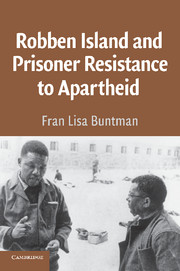Book contents
- Frontmatter
- Contents
- List of Abbreviations
- Foreword by Ahmed M. Kathrada
- Acknowledgments
- 1 Introduction: Prison as a Source of Politics
- 2 Politics and Prison: A Background
- 3 Resistance For Survival
- 4 Resistance Beyond Survival
- 5 Prisoner Politics and Organization on Robben Island
- 6 Debates and Disagreements
- 7 Influencing South African Politics
- 8 Political Imprisonment and the State
- 9 Theorizing Islander Resistance
- 10 Beyond Robben Island: Comparisons and Conclusion
- Appendix I Diagrams of Robben Island Prison
- Appendix II Methodological Notes on Oral and Archival Sources
- Appendix III Capsule Biographies of Interview Respondents
- Select Bibliography
- Index
10 - Beyond Robben Island: Comparisons and Conclusion
Published online by Cambridge University Press: 24 November 2009
- Frontmatter
- Contents
- List of Abbreviations
- Foreword by Ahmed M. Kathrada
- Acknowledgments
- 1 Introduction: Prison as a Source of Politics
- 2 Politics and Prison: A Background
- 3 Resistance For Survival
- 4 Resistance Beyond Survival
- 5 Prisoner Politics and Organization on Robben Island
- 6 Debates and Disagreements
- 7 Influencing South African Politics
- 8 Political Imprisonment and the State
- 9 Theorizing Islander Resistance
- 10 Beyond Robben Island: Comparisons and Conclusion
- Appendix I Diagrams of Robben Island Prison
- Appendix II Methodological Notes on Oral and Archival Sources
- Appendix III Capsule Biographies of Interview Respondents
- Select Bibliography
- Index
Summary
I had done well in gaol, if one can do well there. I was leaving Robben Island in one piece, unbroken in spirit and flesh. Not only could I boast a PG (Prison Graduate), I could boast three academic degrees obtained through correspondence with the University of South Africa. During my 15 years, I had served our prison community through a variety of committees.
I also served in all the underground structures of the ANC, from the committee responsible for drawing the organisation's study programme to the highest committee entrusted with day-to-day administration and organisational discipline in the section. I had lived a full life in a ‘basement’ devoid of natural life.
The prison discipline [of Irish political prisoners] of corporeal debasement had led to the redemptive immersion into the Gaelic language and Irish cultural history; domination had been resisted by new forms of sociation, communalism, and separatism. All these components were identified by the Blanketmen (by Bobby Sands in particular) as central to nation building beyond the prison … Their resistance had provided the elementary forms for sociocultural emancipation beyond the prison.
This concluding chapter assesses the implications of resistance on Robben Island in two different ways. First, I show that political prisoner resistance is not unique, including in the transformative senses identified on the Island. Using the same categories of resistance developed in Chapter Nine, I identify an array of political contexts and time periods, which exhibit political processes very similar to this book's case study.
- Type
- Chapter
- Information
- Robben Island and Prisoner Resistance to Apartheid , pp. 272 - 292Publisher: Cambridge University PressPrint publication year: 2003



